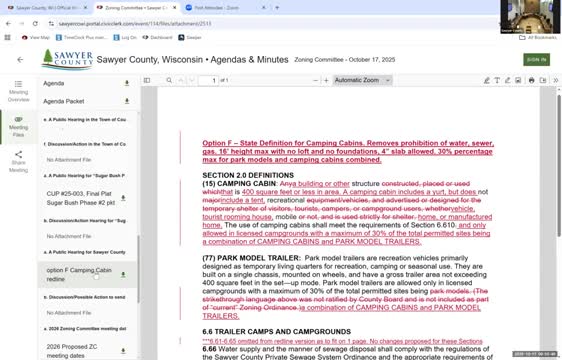Sawyer County zoning committee backs sending campground rule with 30% cap to county board after lengthy public hearing
Get AI-powered insights, summaries, and transcripts
Subscribe
Summary
After a public hearing with residents, campground owners and town officials, the Sawyer County Zoning Committee voted to forward an ordinance amendment ("Option F") to the county board recommending a 30% combined cap on park-model trailers and camping cabins in licensed campgrounds.
The Sawyer County Zoning Committee voted unanimously to forward a proposed amendment to Appendix D of the Sawyer County Code—Option F—to the county board with a recommendation to adopt a 30% limit on the combined number of park-model trailers and camping cabins permitted in licensed campgrounds.
The committee held a public hearing that drew multiple town officials, campground owners and area residents. Many speakers urged clearer definitions and protections for shoreland and septic systems; others representing campgrounds argued for flexibility because the industry has changed and many campgrounds invest heavily in facilities tied to local tourism.
Why it matters: The amendment would codify a cap that towns said they wanted after a town poll. Committee staff reported responses from most towns showing the majority favoring 30%; a few towns preferred 50% or 100%, and Round Lake’s planning commission was split. Proponents of limits said the change is needed to prevent campgrounds from effectively becoming dense year-round residential parks in sensitive shoreline areas and to ensure septic and runoff issues are addressed; opponents warned that strict caps could reduce small operators’ ability to adapt to changing markets.
What was said and by whom: Jenny Chaback (resident/landowner) spoke for residents and town commissions, urging the committee to follow town input and to treat camping cabins as dwellings, not tents, because many are tied to utilities and slabs. Linda Zilmer (Edgewater property owner) urged addressing impervious surface, septic sizing and shoreland protections before any wider allowance. Don Robinson, who identified himself as owner of Lake Chipway Campground and a 40-year operator, said the camping industry has changed and that many operators rely on updated campsite products to remain viable.
Legal and technical context: Committee staff and legal counsel (Rebecca Roper) noted there is no statewide 30% requirement in statute or administrative code; the county would be creating a local limit. Counsel warned that state definitions of "camping cabin" and "park model" do not incorporate a percentage limit and recommended clear ordinance language if the county moves forward. Staff also flagged that because earlier internal ordinance text omitted the 30% cap, existing conditional-use approvals may not automatically be subject to a 30% restriction; determining which campgrounds would be nonconforming would require case-by-case review.
The vote and next steps: The committee approved a motion by Dale Magnuson, seconded by Tweed Schumann, to send Option F with a 30% combined limit to the Sawyer County Board of Supervisors with the committee’s recommendation. The committee asked that towns receive a final draft and noted that a future, separate ordinance could be considered for off-water park-model developments or tiny-house-style parks. County staff said the county will still review septic, impervious-surface and shoreland protections when permitting.
What to watch: The item now goes to the county board; if adopted it will create new limits for licensed campgrounds and may require follow-up work to clarify definitions, enforcement and treatment of existing campgrounds whose approvals lack a 30% condition.
Ending: Committee members said they intend to provide the county board with the towns’ poll results and the public-comment record to show why they recommended 30%.
